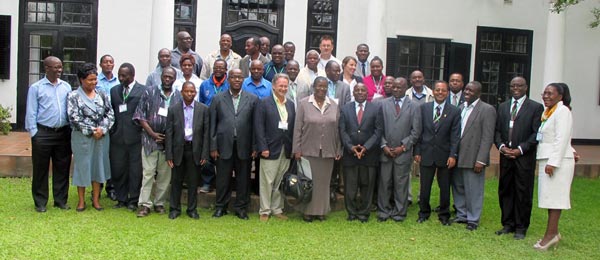Farmers in Zimbabwe and Zambia, who have been losing their maize harvests due to poor storage facilities, can now effectively store their grain in metal silos and super bags, courtesy of Effective Grain Storage for Sustainable Livelihoods of African Farmers (EGSP) Phase- II Project. The five-year project funded by the Swiss Agency for Development and Cooperation (SDC) was launched in Zimbabwe and Zambia on 17 and 20 September 2012, respectively. It aims to improve food security and reduce vulnerability of resource-poor farmers, particularly women farmers, in eastern and southern Africa through the dissemination of metal silos and super grain bags. According to project leader Tadele Tefera, annual post-harvest grain losses in the sub-Saharan region are currently estimated at US$ 4 billion. “This is equivalent to a decade of food aid for the region, or enough annual calories for about 48 million people,” he noted.
The project allows CIMMYT scientists, partners, and collaborators in Zimbabwe and Zambia to exchange ideas, information, and research outputs; raise awareness on promotion and dissemination of effective grain storage technologies; and consult stakeholders on policy environment and market issues for effective implementation of EGSPII. Presiding over the launch in Harare, Danisile Hikwa (principal director of the Department of Research and Specialist Services, Ministry of Agriculture, Zimbabwe) warned of the negative impact of post-harvest losses on food security: “The potential impact of increased maize productivity on poverty reduction and greater livelihood security will not be realized unless technological and institutional innovations are identified and deployed to overcome the chronic syndrome of ‘sell low’ and ‘buy high’. The existing best-bet post-harvest technologies need to be rapidly scaled-up and disseminated in the region.”
Wilfred Mwangi, CIMMYT regional liaison officer, noted that the traditional granaries have failed to protect farmers’ maize harvests against the two most destructive post-harvest insect pests in the region, maize weevils and larger grain borers. “As a result of lack of adequate awareness and access to appropriate technologies, farmers end up selling their maize soon after harvest, when prices are at their lowest, partly to curb the losses and partly to meet other financial needs. The same farmers are forced to buy the grains back at more than twice the price later in the season to meet their subsistence needs, resulting in a continual poverty trap,” said Mwangi.
In her opening address in Harare, Nadia Otigger, SDC quality assurance adviser for South Africa, reiterated her government’s commitment to reduce poverty in southern Africa, as Switzerland just approved a new strategy with focus on agriculture and food security, aiming to contribute to poverty reduction through the promotion of economically, ecologically, and socially sustainable agricultural production, especially for smallholder farmers. Launching the project in Lusaka, Honorable Rodgers Mwewa, Deputy Minister for Agriculture and Livestock, Zambia, noted that self-sufficiency in food grains in the country does not depend only on increased production but also on minimizing post-harvest losses. “It is economical and environmentally appropriate to protect the harvested maize rather than to continue opening up new land and increase application of chemical fertilizers in the name of increasing production,” he added.
Juliane Ineichen, SDC deputy director for Southern Africa, spoke during the launch in Lilongwe and noted that Switzerland expects to see changes in the lives of smallholder farmers with specific needs and requirements who are facing all kinds of challenges while producing crops and providing food; as well as in institutions and policies providing enabling conditions for smallholder farmers to improve their situations.

 Innovations
Innovations 
